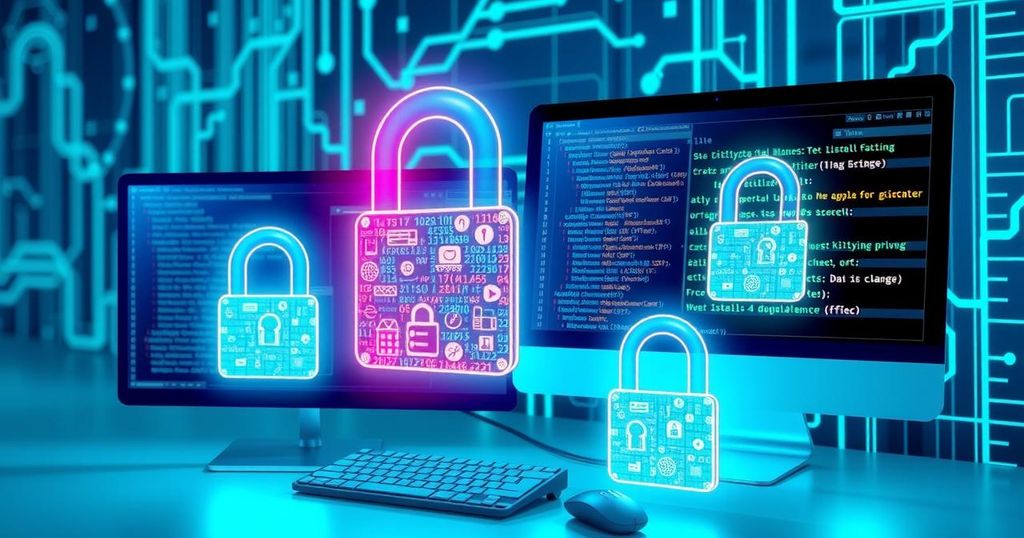Activist Reports Spyware Attack to ICC Amid Libya Torture Investigations
David Yambio, an Italian activist, alerted the ICC about spyware targeting him while he shared details on Libyan torture victims. A Citizen Lab report confirmed his devices were compromised. This incident raises significant concerns over potential governmental interference in ICC proceedings. It prompts scrutiny of Prime Minister Giorgia Meloni’s government regarding surveillance practices, amid criticism of releasing a wanted Libyan national.
A distinguished activist in Italy, David Yambio, has raised concerns with the International Criminal Court (ICC) regarding his mobile phone being compromised while he shared confidential information about torture victims in Libya. According to a report by Citizen Lab from the University of Toronto, Yambio, founder of Refugees in Libya, was targeted by mercenary spyware during discussions with the ICC, with attacks confirmed as early as June 2024.
In his communication with the Guardian, Yambio urged the ICC members to inspect their devices for possible spyware infections. The ICC’s prosecutor’s office refrained from making comments concerning ongoing investigations related to this matter. The incident raises substantial concerns regarding potential governmental interference in ICC proceedings through surveillance of individuals advocating for victims of torture.
This situation might intensify scrutiny on Italian Prime Minister Giorgia Meloni, who has faced ongoing inquiries about the use of spyware by her administration. The examination of the government’s actions follows mounting criticism after authorities in Italy released Osama Najim, also known as Almasri, a Libyan citizen wanted by the ICC for war crimes, who was arrested in Rome amid allegations of torture.
The Citizen Lab study revealed that other activists associated with Yambio, including close friends of Pope Francis, were also targets of sophisticated hacking software typically employed in terrorism investigations. Continued investigations aim to ascertain the exact spyware deployed against Yambio, although it is confirmed that software created by Paragon Solutions, an Israeli surveillance technology firm, was utilized against others.
Researchers, including Luca Casarini and Giuseppe Caccia, highlighted that they found clear evidence of spyware being installed on devices belonging to those targeted. The Italian government has acknowledged its association with Paragon Solutions but denied involvement in the reported surveillance attacks. As a consequence, Paragon has suspended its contract with Italy due to violations of usage rules regarding civil society members.
WhatsApp previously identified that about ninety of its users had been surveilled by clients of Paragon, prompting further investigations into this concern. Yambio was alerted by Apple in November regarding a potential attack and underwent forensic analysis of his device with help from experts at Cyber Hub-AM and Citizen Lab.
Apple stated that the spyware attacks, like the one targeting Yambio, involved complex operations costing millions to develop. They also confirmed that measures were taken in iOS 18 to rectify the vulnerabilities exploited for such attacks. Reports suggest that additional countries including Australia, Canada, and Denmark could be linked to Paragon’s clientele.
John Scott-Railton from Citizen Lab indicated that the new findings necessitate an inquiry into how deployed spyware is monitored and its alignment with domestic laws. John Fleming, executive chair of Paragon US, stated that they uphold strict adherence to their user policies to prevent illicit targeting of journalists and civil society leaders. Furthermore, MEP Hannah Neumann emphasized the need for robust regulations within the EU to combat spyware abuse effectively and ensure justice for victims.
In summary, the alarming case of David Yambio and the associated spyware attacks highlight growing concerns over digital surveillance, particularly regarding the protection of individuals advocating for human rights. The communication with the ICC amid alleged surveillance suggests potential interference in legal processes. The discussions surrounding the misuse of technology emphasize the necessity for stringent regulations to safeguard civil liberties and enhance accountability across governments involved in surveillance practices.
Original Source: www.theguardian.com




Post Comment